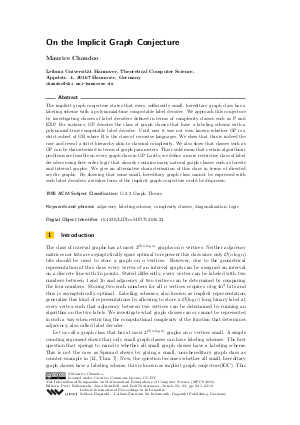On the Implicit Graph Conjecture
Author Maurice Chandoo
-
Part of:
Volume:
41st International Symposium on Mathematical Foundations of Computer Science (MFCS 2016)
Part of: Series: Leibniz International Proceedings in Informatics (LIPIcs)
Part of: Conference: Mathematical Foundations of Computer Science (MFCS) - License:
 Creative Commons Attribution 3.0 Unported license
Creative Commons Attribution 3.0 Unported license
- Publication Date: 2016-08-19
File

PDF
LIPIcs.MFCS.2016.23.pdf
- Filesize: 441 kB
- 13 pages
Document Identifiers
Subject Classification
Keywords
- adjacency labeling scheme
- complexity classes
- diagonalization
- logic
Metrics
- Access Statistics
-
Total Accesses (updated on a weekly basis)
0Document
0Metadata
Abstract
The implicit graph conjecture states that every sufficiently small, hereditary graph class has a labeling scheme with a polynomial-time computable label decoder. We approach this conjecture by investigating classes of label decoders defined in terms of complexity classes such as P and EXP. For instance, GP denotes the class of graph classes that have a labeling scheme with a polynomial-time computable label decoder. Until now it was not even known whether GP is a strict subset of GR where R is the class of recursive languages. We show that this is indeed the case and reveal a strict hierarchy akin to classical complexity. We also show that classes such as GP can be characterized in terms of graph parameters. This could mean that certain algorithmic problems are feasible on every graph class in GP. Lastly, we define a more restrictive class of label decoders using first-order logic that already contains many natural graph classes such as forests and interval graphs. We give an alternative characterization of this class in terms of directed acyclic graphs. By showing that some small, hereditary graph class cannot be expressed with such label decoders a weaker form of the implicit graph conjecture could be disproven.
Cite As Get BibTex
Maurice Chandoo. On the Implicit Graph Conjecture. In 41st International Symposium on Mathematical Foundations of Computer Science (MFCS 2016). Leibniz International Proceedings in Informatics (LIPIcs), Volume 58, pp. 23:1-23:13, Schloss Dagstuhl – Leibniz-Zentrum für Informatik (2016)
https://doi.org/10.4230/LIPIcs.MFCS.2016.23
BibTex
@InProceedings{chandoo:LIPIcs.MFCS.2016.23,
author = {Chandoo, Maurice},
title = {{On the Implicit Graph Conjecture}},
booktitle = {41st International Symposium on Mathematical Foundations of Computer Science (MFCS 2016)},
pages = {23:1--23:13},
series = {Leibniz International Proceedings in Informatics (LIPIcs)},
ISBN = {978-3-95977-016-3},
ISSN = {1868-8969},
year = {2016},
volume = {58},
editor = {Faliszewski, Piotr and Muscholl, Anca and Niedermeier, Rolf},
publisher = {Schloss Dagstuhl -- Leibniz-Zentrum f{\"u}r Informatik},
address = {Dagstuhl, Germany},
URL = {https://drops.dagstuhl.de/entities/document/10.4230/LIPIcs.MFCS.2016.23},
URN = {urn:nbn:de:0030-drops-64389},
doi = {10.4230/LIPIcs.MFCS.2016.23},
annote = {Keywords: adjacency labeling scheme, complexity classes, diagonalization, logic}
}
